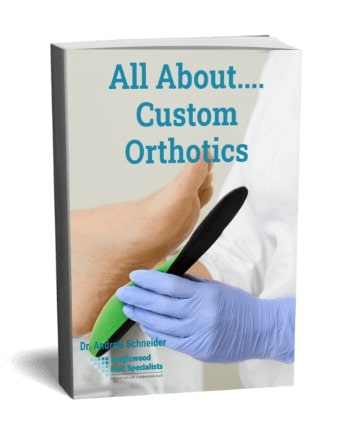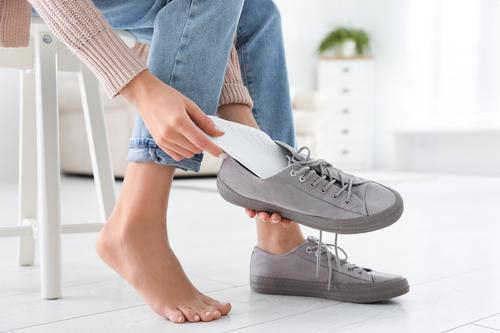You’ve probably heard the rumor that custom orthotics weaken your feet. But is there any truth to this claim? Now, we know that custom orthotics are designed to provide support and correct imbalances. But could they also be making your feet lazy? In today’s post, we’ll take a closer look at that question. And we’ll explain what these medical devices do and don’t do to your feet.
What are custom orthotics used for?
If you’re experiencing foot pain, custom orthotics might just be what you need to regain comfort and stability. These shoe inserts are designed specifically for your feet, providing the right kind of support precisely where you need it. Unlike the one-size-fits-all insoles you’ll find in stores, custom orthotics are crafted based on your unique foot shape and walking pattern.
But when would you need these devices? We often recommend them for conditions such as plantar fasciitis, tendinitis and flat feet. By aligning your foot properly, they can alleviate pain and prevent further issues. Wearing these devices is like having a tailor for your feet, making sure that every step you take is as comfortable and efficient as possible. So, now you know some of the benefits of these devices. But…
Do Custom Orthotics Weaken Your Feet?
Let’s debunk this myth right now. Custom orthotics don’t weaken your feet. Instead, they are designed to support and enhance your foot’s natural movements. They provide the necessary support your feet may lack, correcting imbalance and offering relief from pain and discomfort. They don’t do the work for your feet. Rather, they help your feet function better. They also don’t weaken your feet by restricting movement, like a brace would do. But how is that possible? Crafting custom orthotics is a meticulous process. And understanding what’s involved can help you appreciate why these devices are such an important element of treating many chronic foot problems.
Inside the Crafting Process ![A foot about to stand on an orthotic device]()
We begin by getting a detailed understanding of your unique foot structure. First, we conduct a thorough biomechanical exam of your feet, including an evaluation of your gait. We also take precise measurements of your foot, ankle and lower extremity.
Next, we take a 3D mold or scan of your extremity. It’s important to capture an accurate representation of your foot’s pressure points. This mold or scan acts as a blueprint for the orthotics. After, we send the mold—with a prescription—to a lab where the orthotics are fabricated. And, once they’re ready, they come back to you, ready to support your feet in just the way you need.
How They Work
Custom orthotics can effectively correct foot imbalances, helping to restore your natural gait and improve overall foot strength. They’re not simply about providing comfort. Instead, they’re about correcting the underlying problem. And that happens because the position in which orthotics place your foot has an effect on your muscles. They’ll help to balance you by calming down overactive muscles. Then, they’ll build up those muscles that are currently underactive.
You’ll see a gradual improvement as you continue to use your custom orthotics. And that’s because they also help correct your gait, encouraging your feet to move in a more biomechanically efficient way. That doesn’t just make walking and running more comfortable. It also reduces your risk for injury.
Now, custom orthotics aren’t magical devices. Think of wearing them like wearing eyeglasses. While you wear glasses, you can see. But when you take them off? You can’t! And, even if you’ve been wearing glasses for years, they can’t correct your vision issues—they can only compensate for them. In this same way, a custom orthotic compensates for your lower extremity mechanics while you’re wearing them. They don’t, however, provide a lasting correction if you stop wearing them.
Custom orthotics can greatly enhance your comfort and functionality, making daily activities and exercise more enjoyable. The personalized support helps to reduce strain in your ankles, feet and lower legs. When you’re not battling discomfort, you’ll find it easier to stay active and engage in the activities you love.
These devices also facilitate better biomechanics during movement. They encourage proper foot alignment, promoting efficient stride and enhanced performance. Whether you’re walking, running, or standing for long periods, custom orthotics can make a significant difference. You’ll notice the benefits in all aspects of your daily life. Beyond enhancing comfort and performance, they can play a pivotal role in various foot disorders. Let’s take a closer look.
Additional Benefits
By aligning and stabilizing your foot and ankles, orthotics reduce strain on these areas. In turn, you can help prevent overuse injuries that can prove debilitating. If you have flat feet or high arches, they’re a lifesaver. These devices can correct structural abnormalities, reducing your risk of developing complications. While many people fear becoming dependent on their inserts, it’s a myth that orthotics weaken your feet. You may think that once you start wearing orthotics, your feet won’t work properly without them.
However, orthotics are a therapeutic tool. They’re not crutches. These devices are design to correct specific foot imbalances, not to replace your foot’s natural capabilities. Just like glasses don’t make your eyes weaker, orthotics don’t weaken your feet. They simply provide the necessary support and alignment that helps your feet work more efficiently.
If you’re dealing with pain or discomfort, don’t let the fear of dependency stop you from seeking relief. Remember, orthotics are there to assist your feet, not make them dependent. So, if you’ve been avoiding getting fitted for these medical devices out of fear of foot weakening, stop worrying and click here to request a consultation with our Houston podiatrist. When you come into the office, we’ll determine if your feet could benefit from orthotic support, and get you started on the fitting process if they could help correct imbalances in your body!
















